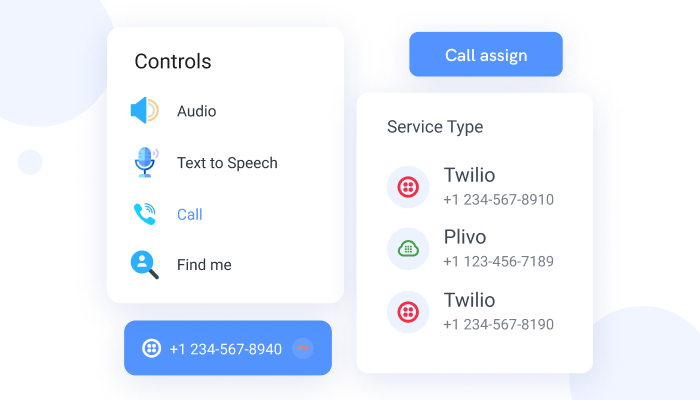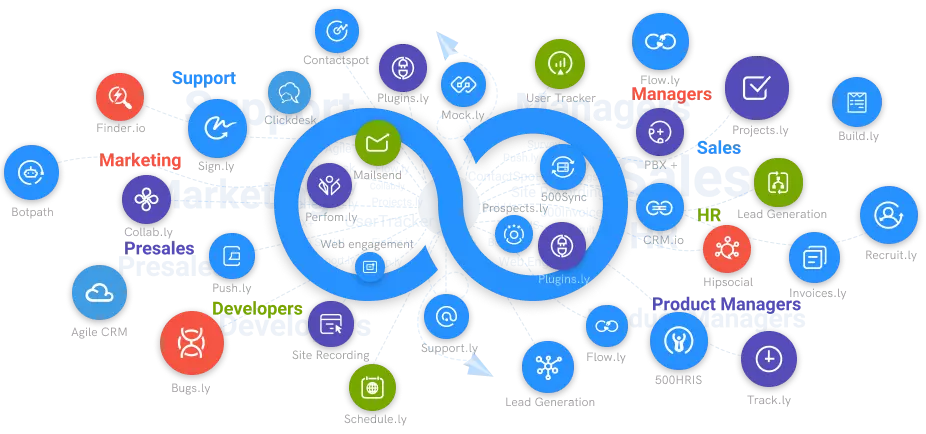What are the Different Types of PBX Systems?
The virtual PBX phone system has evolved and grown rapidly over the past few years. No wonder, every medium and large enterprise is starting to leverage the power of PBX.
#1
Get unlimited phone lines, IVR flows and minutes and never miss a single call
#2
Improve caller satisfaction while reducing cost with multi-level IVRs
#3
Add call activities and route calls real-time based on the lead owner in your CRM
#4
Respond to customer concerns quickly with voicemail transcriptions
#5
Choose toll-free and local numbers from 48+ countries
#6
Use the REST step to integrate your IVR flow with your database and backend
#7
Bring your favorite provider for the best possible rates ever
#8
Embed click-to-call widget on the website to increase leads
#9
Unbelievable pricing - the lowest you will ever find
#10
Everything your business needs - 50 apps, 24/5 support and 99.95% uptime
As it is with all the other tools, businesses have to make sure the PBX that they are implementing at their end exactly meets all their requirements. There are many types of PBX businesses that should consider adopting but not all types will actually meet the need.
Let’s discuss different types of PBX first so that you know the pros and cons of each one of them and identify which suits your business better.
Overall, there are 5 types of PBX systems that small and medium-sized businesses (SMBs)
1. Legacy PBX
Traditional PBX is the grand old structure of having multiple phone lines dividing into multiple extensions. Businesses in the old days used to use this technology to carry out communication activities.
This pbx system requires maintenance after a stipulated period of time to ensure maximum efficiency. This system also comes with the installation charge and keeps you dependent on the third-party for upgradation.
2. On-Premise PBX
As the name suggests, the on-premise pbx system has to be installed in the business premises. The on-premise PBX system also requires a dedicated telephone wiring that is exclusively maintained by an experienced PBX technician.
On-premise PBX uses Public Switched Telephone Network (PSTN) and Integrated Services Digital Network (ISDN) technologies to connect to the telephone lines.

It comes with various important advantages such as
- Ability to continue using current telephone carrier.
- Cost-saving due to server ownership.
- Ability to introduce open-sourced features.
- Greater control
- Hybrid PBX
3. Hybrid PBX
Hybrid PBX is the sweet spot between legacy and on-premise PBX. It allows businesses to use VoIP on their telephone-dominated PBX. A Hybrid PBX system uses both PSTN and Session Initiation Protocol (SIP) to carry out communication with the outside world.
The most important advantage of Hybrid PBX is the flexibility it offers. It possesses the ability to switch to the other network whenever there is an issue with the legacy PBX and VoIP networks.
It’s also worth noting that hybrid PBX is highly useful for remote offices. You don’t need to pay an additional cost as the call from one of your offices to another doesn’t have to be chargeable. Previously, businesses used to use cordless phones to connect directly to the hybrid PBX.
The major drawback of Hybrid PBX is cost. Not all businesses can afford to leverage and maintain on-premise PBX to use a full-fledged hybrid PBX. You might have to shell out thousands of dollars to deploy hybrid PBX and still end up putting in more money for its maintenance.
4. Hosted PBX
Unlike legacy, on-premise, or hybrid PBX, hosted PBX is a type of virtual PBX where PBX service is provided using existing broadband service. There’s no physical machine installed in this setup. This also means that you need to deploy or install any third-party software or hardware to carry out business communication.
In the hosted PBX, no telephone lines are involved and entire communication takes place using SIP trunks technology. You just need to have some pre-configured IP phones. Once you have that, it’s a plug-and-play game. Once connected to your broadband, hosted PBX uses your internet connection to make and take calls and provide enterprise-grade PBX service.
Hosted PBX is a modern solution for PBX services and provides the freedom to your teams and customers to connect from anywhere across the world. You can host your services on any server—inbuilt or third-party—to provide PBX services.
It’s not only cost-effective but also provides important benefits such as remote friendliness, cloud support, and much more.
5. Cloud PBX
Cloud or SaaS is the most evolved PBX system available out there. You get complete control over handling all your PBX activities with the cloud-based PBX system.
Being a Virtual PBX, it allows businesses to overcome space and cost constraints. It helps you connect all your devices to a cloud-based phone system. After that, you get to add a whole lot of customizations and integrate your system with SMS and other essential services using an application programming interface (API).
Just like the hosted PBX, you don’t have to deploy cloud-based PBX anywhere. You can control your call flows using a virtual interface on your personal computer (PC) in a software form.
Cloud PBX also uses VoIP and must be connected to the internet all the time to ensure perfect uptime. Cloud PBX is the technology of the future where everything is done from your PC and you don’t have to rely on any third-party services. All the upgradation activities can easily take place over the internet without risking your data and facing any technical disturbances.
As you are now clear with the types of PBX, it entirely depends on your requirements to choose what PBX works better for you. Cloud PBX, like PBXPlus, works really well for the emerging businesses who are trying to make their mark and need something cheaper-yet-powerful to grow further.





